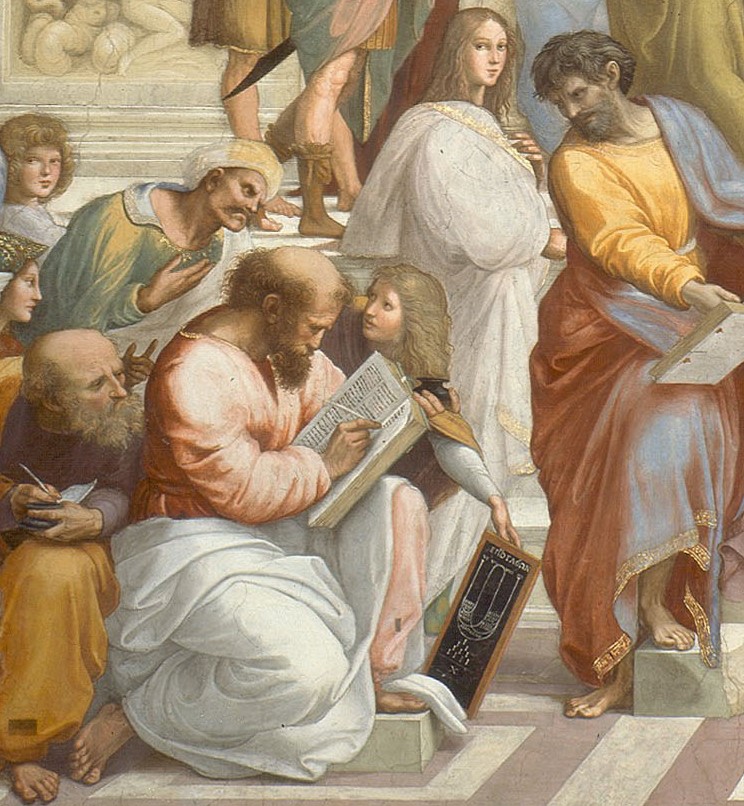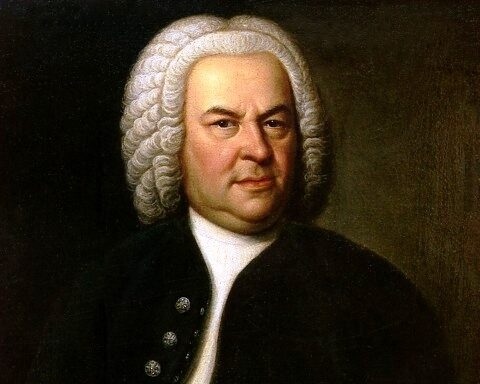Pythagoras
Greek mathematician and philosopher
– Who does not know how to shut up does not know how to speak –
- Considered the father of mathematics, arithmetic and geometry.
- Subjects : Philosophy, mathematics, music, ethics and astronomy
- Known for : Pythagorean Theorem, Harmony of the Spheres, Pythagorean Tuning
- Student of : Anaximander
- Name : Greek pronunciation
Summary
Ionian philosopher, founder of Pythagoreanism. His political and religious teachings influenced Plato as well as Aristotle and, through them, Western philosophy. Around 530 BC C., he traveled to Crotona in southern Italy, where he founded an initiation school. The strongest teaching identified with Pythagoras is metempsychosis, or the “transmigration of souls,” which holds that every soul is immortal. He contributed to the advancement of mathematics, geometry, and arithmetic, derived particularly from numerical relations. He is credited with, among others, the theory of the functional significance of numbers or the Pythagorean theorem for right triangles.
Questions and answers
- What did Pythagoras discover?
-He is credited with the theory of the functional significance of numbers in the objective world and in music; the incommensurability of the diagonal of a square with a measurable side or the Pythagorean theorem for right triangles. - What is Pythagoras known for?
-He devised the theory that numbers are of great importance in understanding the natural world. Pythagoreanism cultivated the concept of number, which became for them the crucial principle of all proportion, order, and harmony in the universe. Through these studies, they established a scientific foundation for mathematics. - What was the religion of Pythagoras?
-The Pythagoreans believed that after death the human soul reincarnates in other animals and, therefore, that all living beings have a certain kinship. - What is the Pythagorean theorem?
-Affirm that the area of the square whose side is the hypotenuse is equal to the sum of the areas of the squares of the other two sides. - What works of Pythagoras are preserved?
-No original writing of Pythagoras has been preserved
“Help your fellow men to lift their load, but do not consider yourself obliged to carry it”
Pythagoras
Pythagoras is believed to have been born in 569 BC on the island of Samos , off Miletus , the son of Menesarchus, perhaps a wealthy merchant from Samos.
Pythagorean Fraternity
He probably traveled to Egypt, Phoenicia and Babylon. He returned to Samos during the dictatorship of Policrates (538-522). About 529 he traveled to southern Italy and founded the Pythagorean brotherhood at Crotona .
Pythagoras
Schooled in the teachings of early Ionian philosophers such as Thales of Miletus , Anaximander , and Anaximenes . Around 530 BC he settled in Crotona, a Greek colony in southern Italy, where he founded a movement for political and philosophical purposes, known as Pythagoreanism .
Philosopher
Pythagoras’ philosophy is known only through the work of his disciples. The Pythagoreans advised obedience and silence, abstinence, simplicity of dress, and self-analysis.
The first prominent modern vegetarian was Pythagoras. The Pythagorean diet came to mean avoiding meat from slaughtered animals.
Pythagorean ethics first became a philosophical morality between 490-430 BC with the desire to create a universal and absolute law including an order not to kill ”living creatures”, refrain from ”disgusting shrill killing”, in particular animal sacrifices, and ”never eat meat” – from ”The Feast of Heretics”.
They believed in immortality and the transmigration of the soul. Pythagoras claimed that he had been Euphorbus, and fought during the Trojan War.
Mathematical
Among the mathematical investigations of the Pythagoreans are their studies of odd and even numbers , of prime numbers and of squares , essential in number theory. They cultivated the concept of number, which became for them the crucial principle of all proportion, order, and harmony in the universe. Through these studies, they established a scientific foundation for mathematics.
Theorem of Pythagoras
In geometry they discovered the hypotenuse theorem , known as the Pythagorean theorem , which states that the square of the hypotenuse of a right triangle is equal to the sum of the squares of the other two sides. In astronomy , the Pythagoreans meant an advance in classical scientific thought, since they were the first to consider the earth as a globe that rotates together with other planets around a central fire.
Astronomer
They explained the harmonious order of all things as bodies moving according to a numerical scheme, in a simple and all-encompassing sphere of reality. They thought that the heavenly bodies were separated from each other by intervals corresponding to lengths of harmonic chords and maintained that the movement of the spheres gives rise to a musical sound, the so-called harmony of the spheres .
Death
The Pythagoreans achieved great political influence in Magna Graecia (southern Italy), which provoked reactions against them. The first forced Pythagoras to leave Crotona and retire to Metaponte , where he is said to have starved himself to death in 495 BC, although there are other accounts of his death.
Recapitulation
-
- Pythagoras studied mathematics, music, and philosophy in Egypt and Babylon.
- He founded the Pythagorean philosophical school at Crotona.
- Introduced the concept of irrational numbers.
- He developed the Pythagorean theorem.
- He was the first to postulate that the Earth is round.
- He contributed to the advancement of mathematics, geometry and arithmetic, derived particularly from numerical relationships.
- The Pythagoreans believed that everything in the universe could be expressed in numbers, in immortality and in the transmigration of the soul.
Did you know…
peculiar practices
The Pythagoreans were known for some peculiar practices, such as not eating beans, not picking up any dropped objects, not touching a white rooster, not stirring fire with iron, or not breaking bread.
THE GOLDEN VERSES
attributed to Pythagoras
Honors, in the first place, and worships the immortal gods,
each according to their rank.
He then respects the oath, and reveres the illustrious heroes,
and also the subterranean geniuses:
you will thus fulfill what the laws command.
Then honor your parents and your blood relatives.
And of the others, befriend the one who excels in virtue.
Yield to gentle words and do not oppose helpful deeds.
Do not hold a grudge against your friend for a minor fault.
These things do them to the extent of your strength,
because what is possible is found next to what is necessary.
Get involved in fulfilling these precepts,
but be careful to control
first the needs of your stomach and your sleep,
then the outbursts of your appetites and your anger.
Never commit a shameful action,
Not with anyone, not alone:
Above all, respect yourself.
Then exercise yourself in practicing justice, in words and in deeds,
Learn never to behave without reason.
And knowing that dying is the fatal law for all,
that riches, sometimes you like to win them and other times you like to lose them.
Of the sufferings that fit mortals by divine design,
the part that corresponds to you, bear it without indignation;
but it is legitimate that you seek a remedy to the extent of your strength;
because there are not so many misfortunes that fall on good men.
Many are the voices, some unworthy, others noble, that come to hurt the ear:
Do not be disturbed or turn around so as not to hear them.
When you hear a lie, take it easy.
But what I am going to tell you now
is that you must always fulfill it:
Let no one, by his words or his actions,
move you to do or say anything that is not the best for you.
Reflect before acting so as not to commit foolishness:
Acting and speaking without discernment is for poor people.
You, on the other hand, will always do what cannot harm you.
Do not go into matters that you do not know,
but learn what is necessary:
such is the norm of a pleasant life.
Do not neglect your health either,
have moderation in eating or drinking,
and in the exercise of the body.
By moderation I understand what does not hurt you.
Get used to a healthy life without softness,
and beware of what can attract envy.
Do not be dissipated in your expenses
as do those who ignore what honesty is,
but do not stop being generous for that:
there is nothing better than moderation in all things.
So do what does not harm you, and reflect before acting.
And don’t let sweet sleep take over your languid eyes
without first reviewing what you’ve done that day:
“What have I failed to do? What have I done? What duty have I failed to fulfill?”
Start from the beginning and go through it all,
and reproach yourself for the mistakes and cheer for the successes.
This is what needs to be done.
These things you have to strive to practice,
These things you have to love.
Through them you will enter the divine path of perfection.
For who transmitted to our understanding the Tetratkis,
the source of perennial nature.
Go ahead then! get to work,
not without first begging the gods to lead him to perfection.
If you observe these things you will
know the order that reigns between the immortal gods and mortal men,
in what things are separated and in what they are united.
And you will know, as is fair, that nature is one and the same everywhere,
so that you do not expect what is not to be expected,
nor is anything hidden from your eyes.
You will meet men,
victims of the evils that they impose on themselves,
blind to the goods that surround them, who neither hear nor see: there
are few who know how to free themselves from misfortune.
Such is the destiny that hinders the spirit of mortals,
as children’s beads roll from one side to another,
oppressed by innumerable evils:
because without realizing it they are punished by Discord,
their natural and sad companion,
who must not be provoked, but give way and flee from her.
O father Zeus! How many evils would you not free men from
if you only made them see what demon they obey!
But for you, have confidence,
because human beings are made of a divine race,
and there is also the sacred nature that shows them and discovers all things.
From all of which, if you take what belongs to you, you will
observe my commandments,
which will be your remedy, and will deliver your soul from such evils.
Abstain from food as we said,
Be it for purifications, be it for the liberation of the soul,
judge and reflect on all things and each one,
raising your mind high, which is the best of your guides.
If you neglect your body to fly to the free orbs of the ether, you will
be an immortal god, incorruptible,
no longer subject to death .











